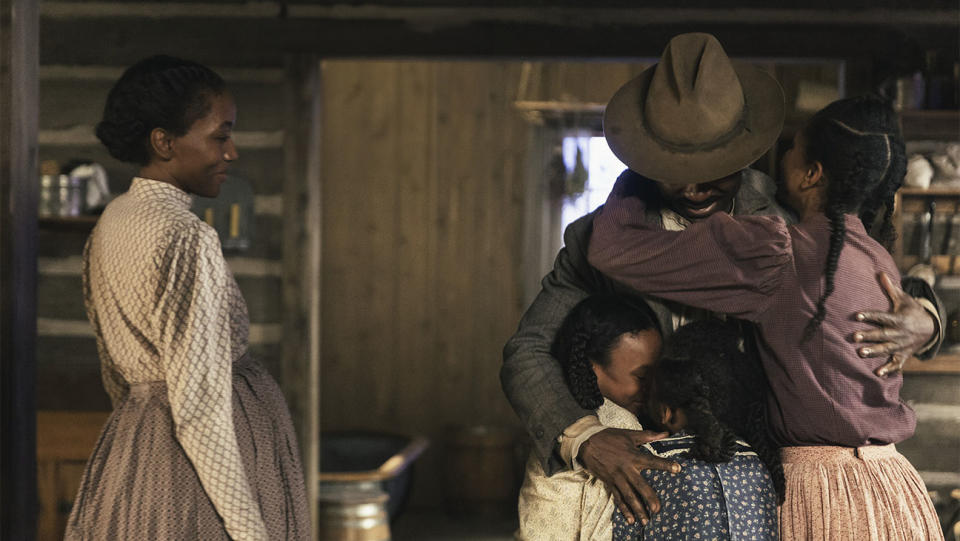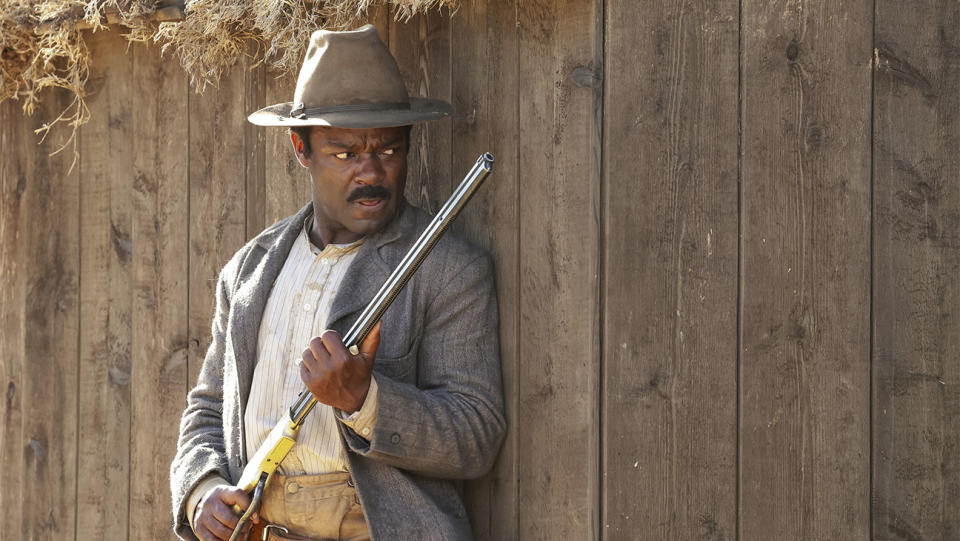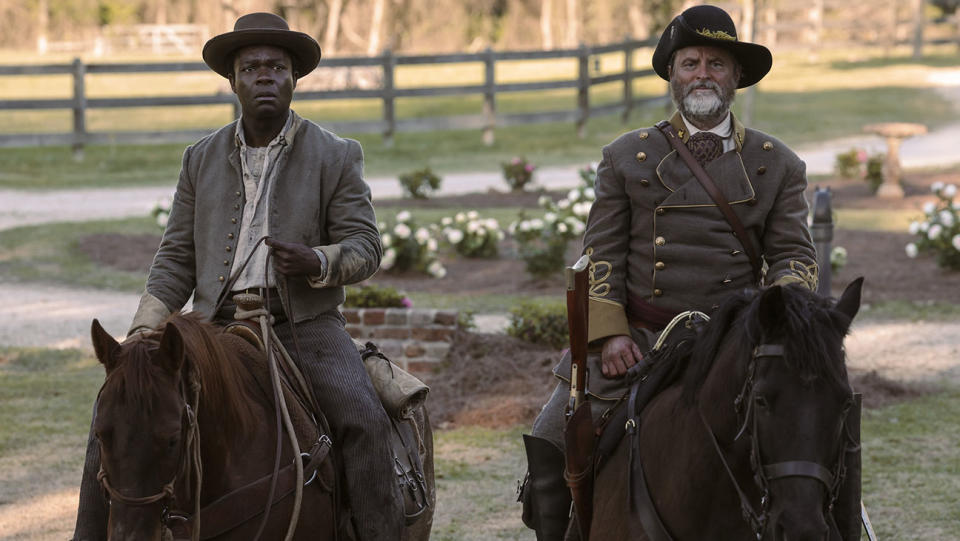David Oyelowo Couldn’t Believe Bass Reeves Wasn’t More Widely Known — and That Led Him to ‘Lawmen’
- Oops!Something went wrong.Please try again later.
- Oops!Something went wrong.Please try again later.
- Oops!Something went wrong.Please try again later.
- Oops!Something went wrong.Please try again later.

When Lawmen: Bass Reeves viewers first meet David Oyelowo’s character, creator Chad Feehan’s version of legendary Deputy U.S. Marshal Bass Reeves is not the man that many history buffs speak of. He is not the mystical lawman figure who many say influenced the creation of the Lone Ranger character in Hollywood.
This Bass Reeves (portrayed by Oyelowo) is a fearful but devoted enslaved soldier in the Confederate Army during the Civil War. He is forced into service by Arkansas slave plantation owner and Confederate Army Major George Reeves (played by Shea Whigham). White Confederate soldiers and Black slaves forced to participate in the war instantly take notice that Bass is treated differently by Major Reeves: He’s a slave who is allowed to ride on top of a horse next to his owner, as the officer knows Bass has a gift of being an accurate shot with a rifle and gun.
More from The Hollywood Reporter
Bass follows the commands of his plantation owner (George Reeves manipulates his slave’s strong Christian beliefs, reminding him that the Bible makes clear that a good slave must obey his master). But there is a sense that the world he was born in, and the war he’s been thrust into, trouble Bass’ spirit. Oyelowo allows this uneasiness to come across in clear transparency when a field slave looks Bass up and down in his Army fatigues and admonishes him for fighting on “the wrong side.”
Ironically, it’s Bass’ strong Christian beliefs — and George Reeves’ deceitful promise of emancipation from slavery if Bass beats him in a rigged card game — that sets into motion the man the world would come to know as a legendary lawman and hero. Bass becomes so enraged that his slaveowner would trick him and not fulfill such a merciful promise, that he beats his slaveowner nearly to death with his bare hands (admonishing his trickery as being un-Christian) and runs away from the plantation to save his own life. The Civil War eventually ends and Bass Reeves goes back to Arkansas to claim his wife and child. The rest is history.
Midway through the season of the Paramount+ series, Oyelowo spoke with The Hollywood Reporter over Zoom to talk about his nine-year journey to bring his vision of the Bass Reeves story to life for Taylor Sheridan’s latest series, and why it was of dire importance for him to tell the lawman’s full story.
***
First, David, I have to ask — and you can lie so as to not hurt any feelings — but did you miss the media during the long duration of the actors strike?
Absolutely! (Laughs.) Absolutely, especially with a project like this! I’m so proud of it. It’s one that you want to speak about and do everything you can to bring awareness to. So, it was like being in an open prison — not being able to get out there and talk to you guys.
Bass Reeves’ story has been told through small independent films, and in fictional character examinations in films like The Harder They Fall and HBO’s 2019 series Watchmen. When did you become interested in this man, who many consider a great American and great African American hero, and decide you wanted to explore this larger-than-life character even further onscreen?
I think your question was what made me interested in this larger-than-life character. That very thing: Larger than life, extraordinary historical figure, couldn’t believe when he was first brought to my attention in 2014 that he wasn’t more widely known; haven’t seen a movie, haven’t seen a TV show. It was like, what the heck? And that’s where my obsession with rectifying that in some way came along.
But also, it’s the uniqueness of the story, to go from being enslaved to empowered in the way he was, and to then have a career — a 32-year career in law enforcement in literally one of the most dangerous territories in those times — to be law enforcement in this country’s history. To have the record he had. You know, if he was white there would be monuments, there would be multiple movies, there would be graphic novels, everyone would be dressed up as him for Halloween. We know why it hasn’t been the case, and so rectifying that and telling his story as best as I could genuinely has been a seven- to eight-year [journey]. I’m just glad we’re here.

How did you and Taylor Sheridan meet to make this series a reality as executive producers?
I’ve known Taylor for a while. We met at the Sundance Film Festival quite a few years ago now, but this was before Yellowstone. And like I say, having been approached with this project by a producer in 2014, [the producer and I] went out with it in 2015, the whole town turned it down saying, “We’re not doing that because no one is doing Westerns.” We went out again in 2017 and they said, “Oh, we’re not doing that because everyone is doing Westerns,” and you just go, “OK, there’s something funny that is going on here.” And I already had a similarly long journey with trying to get Selma made; so, I knew what was at play.
And it wasn’t until the sort of reinvigoration — not only of the Western, but it’s a certain kind of storytelling that Taylor has brought back to popularity, and to prove that there is a massive audience for it is one of the ways you get a show like a Bass Reeves off the ground. And so, we had a conversation a few years ago now, and with time it just became more of a self-fulfilling prophecy that this was going to happen. I think that [Yellowstone prequel series] 1883 was also a moment where you go, “OK, now we’re in the zone. Now this really shows that an audience will embrace this.” So that was really the gem.
How does your portrayal of Bass Reeves differ from the few others we have seen in film and on TV?
What I was very focused on was the fact that this is a man with so many things roiling in his heart and head. He has been enslaved. He knows what injustice, marginalization, subjugation, brutality looks like. And he’s now going to go into an arena where he is going to not operate from a place of vengeance, but justice; true justice while arresting white people — some of whom were the very people who continue to have that mindset, and had that toward him when slavery was still pervasive, and people who are hoping that those days come back. Which you could argue, Jim Crow to a certain degree did.
There’s so much going on in his mind. There’s so much conflict. “Am I arresting a Black man who has had to do things for his survival that are tantamount to criminality, but I can relate to why he did it?” Reeves is dealing with the conflict in his heart over that. We saw him almost beat George Reeves to death because of how unjust the treatment was. You could argue that with time, Bass Reeves would be the person deployed with a writ to arrest someone who did that.
And so, for me, the other depictions, the other representations of Bass Reeves, I don’t think were afforded the opportunity to go into that level of complexity and density of what the character was probably having to deal with. Then you factor in what it must be like to be away from your family, not knowing if you’re going to see them again because of how dangerous your job is, and all of those things. To give the character complexity was the thing that I was most focused on.

Do Bass Reeves’ strong Christian beliefs set the foundation for his views on justice and equality? Or was that a struggle within itself, as religion was used as a weapon to justify slavery and keep enslaved people in line, as we see in conversations between Reeves and slave owner George Reeves (Shea Whigham) in episode one?
For sure. That’s the core value on which his notion of justice was built. I think without it, it would be almost impossible not to be more vengeful in his disposition. That was definitely what shaped his moral compass, I would say. And I love the fact that we didn’t shy away from that. In fact, to me it was one of the things that I gravitated toward. I’m a Christian myself. I know how that informs my choices, my life, my marriage, my kids, and that we rarely see that. And for Black people in this country, that is a huge part of our culture. That is a huge part of what drives us; how we see the world. And you see that in this character. It was definitely not something to be shied away from.
This series shows many angles of Black American life post-slavery: The first pieces of Black middle class in episodes three and four; Black families beginning to have to contend with the rise of Jim Crow and whispers of the rise of the Ku Klux Klan in episode five. And in episodes three, four and five, Black American citizens talk about carving out self-contained communities for themselves that would lead to towns and communities such as Rosewood, Florida, and Black Wall Street in Tulsa, Oklahoma. Was this intentional, and why was this important for you to show in the series?
Absolutely deliberate! Another period, just generally in this country’s history, that I am confounded by the fact that we haven’t seen more of on film is the Reconstruction Era. And I think you and I both can guess why we haven’t seen enough of it, but if America is often referred to as an experiment, that was the red-hot eye of the experiment. To come out of slavery in the wake of civil war, to have this period where you had Black people being given a level of agency they had never been afforded in this country before — which is why Tulsa happened, which is why Jim Crow happened, which is why Rosewood happened. It was an attempt to regress that progress. But it was a glimpse into what America could go on to be, and took another 100 years, you could argue, before it truly was because of the regression there.
And so, to start with the Civil War and see the beginnings of this 12-year period where someone like Bass could exist — before, there’s no way Bass Reeves becomes a Deputy U.S. Marshall. Even into Jim Crow, his power diminished so much that he became a beat cop by the end of his career, nothing akin to what he was in in this period. To see that was something that was very important to me and to us.

David, being part of the African Diaspora — if one broadens that definition to include not just descendants of enslaved people brought to the Americas and the Caribbean, but also colonized African nations — do you feel your life experiences, even while growing up in U.K., still helped you resonate with these Black American characters? And this is looking at your portrayal of Reeves and other African American legends such as Dr. Martin Luther King Jr. Do you think those resentments are over by some Black Americans who have said, “He’s not African American, so how could he play this role?”
That division that you talk about was imposed upon us. Slavery was imposed upon us. I don’t think that we as Black people should embrace it as a division. For anyone who’s done their 23andMe [genetic DNA testing] recently, I’m sorry: We’re linked. We’re the same people! Yeah, there’s more mixture in there, but you know the amount of my African American friends, it tends to be in the 40 to 50 percent range of, “You are African, bruh, whether you like it or not.” We are connected. And I’m not going to embrace what was imposed upon us, and certainly not from a storytelling point of view. I consider my job to be holding up a mirror to humanity as I see it. And on any given day, as any actor would, the work should be judged on its own merit as opposed to — you know, I’m not interested in playing myself.
I am very committed to the contextualization of us as Black people from a global point of view; so, that’s why I do African narratives like A United Kingdom and Queen of Katwe. That’s why I do European narratives where I was born and raised. That’s why I’m very, very plugged into telling American stories, a place I’ve called home for 16 years and that I’m a citizen of, and I’m raising American kids within. For me as a citizen of the world, I’m just looking for ways to continue to contextualize who we are globally as Black people, and I refuse to allow divisions imposed upon us to dictate anything I do and how I see myself and the world around me.
Why is this series called Lawmen? Is there another component to it? Is season two in the works?
The idea, going forward, is to have other lawmen in history whose story should be told, who haven’t been told, to have the opportunity to tell those stories. I think there is a feeling, which I very much resonate with, that there is real potency and interest in telling stories of this nature about those who, for whatever reason, fell out of history unjustly. I’m a producer on those going forward; so, the idea is to keep the good work going.
***
Lawmen: Bass Reeves streams Sundays on Paramount+.
Best of The Hollywood Reporter

